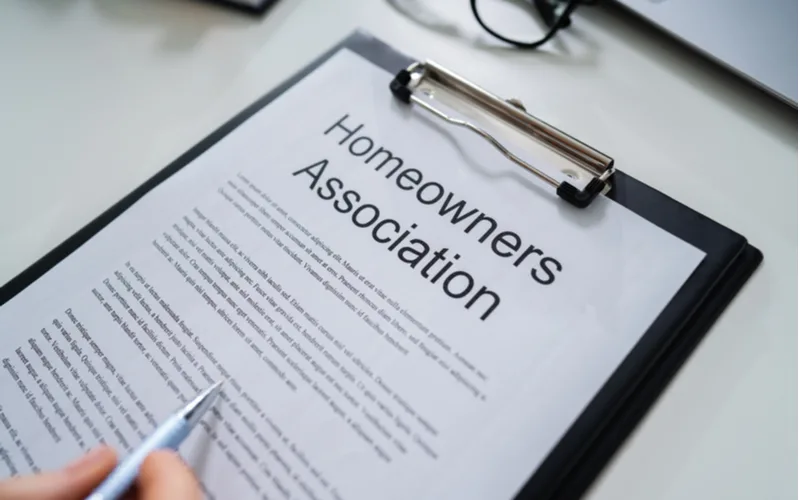Wanting to know how to legally annoy your HOA?
You’re in the right place. I used to manage investment properties, so I know how pesky HOAs can be. And you can bet I came up with some great ways to annoy them.
Wondering How to Legally Annoy Your HOA?
When the HOA starts to feel overbearing, there’s nothing more satisfying than making the board’s life a little bit more difficult.
I’d know—I used to be a property manager. And you can bet I dealt with bored HOA managers on a daily basis.
And while many are friendly and accommodating, the stereotype of a nitpicky and bored HOA manager exists for a reason. Fortunately, there are plenty of ways to annoy your HOA without landing yourself in legal trouble.
Want to learn more? Read on. While it’s not foolproof, you’ll have a decent leg to stand on when confronted by an HOA manager who’s trying to push you around. You just need to push back harder.
10 Ways to Annoy Your HOA Legally

Smolaw/Shutterstock
If your HOA has been getting on your nerves lately, send a message by trying out one of these ten legal ways to cause a nuisance for the board.
1. Ask for Copies of Everything
Few things cause an HOA board more time and frustration than additional paperwork. However, as a paying HOA member, you’re entitled to ask for copies of HOA statements.
Every time the HOA schedules a meeting, they have to record minutes covering every point of discussion and any questions from attendees. All HOA members can request detailed copies of these minutes from their board at any time.
All the extra paperwork may deter your HOA board from scheduling long or pointless meetings that eat into your spare time. You can also request copies of financial statements detailing how, when, and where HOA funds get spent.
By law, your HOA must provide detailed printouts to any paying member. Not only is this time-consuming and tedious for board members, but it also lets you ensure that HOA funds are getting spent responsibly.
2. Study the Rulebook
Every HOA neighborhood has its own set of rules and regulations that members must follow. Anyone who moves into an HOA neighborhood has to sign an agreement upon closing stating that they agree to follow local ordinances or risk facing a penalty such as a fine.
Unfortunately, most of these agreements come with a fairly hefty handbook. When buying a new home in an HOA neighborhood, it can be tempting to bypass the small print to get things moving.
Even HOA board members may not be completely familiar with every small regulation set in place.
By studying the HOA rulebook carefully, you can ensure that you don’t accidentally break any rules that may land you with a fine. Better yet, you can find loopholes that allow you to skirt around regulations without receiving a penalty.
With your newfound knowledge of HOA rules, you may also catch HOA board members committing infractions of their own! Not only will this shame them in front of their fellow board members, but it may also help you effect change for more petty ordinances.
3. Install Satellite Dishes or Solar Panels

WithGod/Shutterstock
If your HOA is nagging you about keeping in line with the neighborhood aesthetic, you can really get under their skin by adding protected installations such as solar panels or satellites to your home.
For example, many states have “Solar Access Rights” laws that prevent HOAs from restricting solar access in their neighborhood. The HOA will need to allow any solar panel installation on the roof or in the yard, no matter how ugly.
Some states also have laws protecting satellite dishes, meaning that your HOA board can’t prevent you from getting a dish. What’s more, the board can’t stop you from placing solar panels or satellite dishes in a highly visible location.
If your HOA fights you over the perfectly legal purchase and installation of satellite dishes or solar panels, you can often call the service company to intervene on your behalf. You won’t have to hire an expensive lawyer or spend time taking your HOA board to court.
4. Add Native Plants to Your Landscaping

Breadmaker/Shutterstock
While the HOA will typically have some say over what you can and can’t plant in your yard, their jurisdiction only extends so far. Most states have native plants protected by law to encourage their growth and support a thriving ecosystem.
If you plant a protected species in your yard, your HOA can’t do anything to force its removal. Even trees that exceed height codes or florals that don’t match color schemes can sneak past this loophole in HOA laws.
It’s important that you do your research to ensure that you plant the correct species in your yard if you want legal protection. If your HOA objects, you can use your research to educate them on state laws at the next board meeting.
5. Decorate With Religious or Political Symbols

Image Source: thepostathens.com
According to the Fair Housing Act, HOA rules can’t legally discriminate against a particular religious ideology. If you add a symbol, such as a cross or a Star of David, to your landscaping, your HOA can’t force you to remove it.
Even if you have oversized or gaudy décor, the HOA has no legal recourse.
Keep in mind that you should still be respectful of your neighbors when displaying religious symbols. It’s best to keep things tasteful and avoid infringing on their home’s view.
You may want to discuss your plans with nearby neighbors to ensure that your newest garden décor doesn’t come as a shock.
Political symbols can be a little bit more complicated, as the law doesn’t protect them in the same way as religious symbols. While some HOAs have rules banning political signs, these are often poorly enforced and difficult to regulate.
Adding a political sign to your yard can cause a headache for your local HOA board, especially around election time. Like religious symbols, always try to be tactful when placing political signs and sensitive to your neighbor’s view.
6. Push Off HOA Requirements Until the Last Minute
One of the primary requirements of being a homeowners association (HOA) member is paying annual HOA fees.
These fees cover the cost of maintaining and managing common areas and amenities within the community, such as swimming pools, landscaping, and security services.
While the amount of HOA fees can vary widely depending on the size and scope of the community, they are typically mandatory, and failure to pay them can result in penalties, late fees, or even legal action.
Although you are bound to pay the annual or monthly fees associated with your HOA membership, that doesn’t mean you have to pay them early.
Waiting until the very last minute to provide payment will likely result in extra work on behalf of the board. They will often have to create multiple reminders for payment as you hold off on cutting the check.
7. Overuse the Amenities

Bignai/Shutterstock
Homeowners associations often provide amenities such as swimming pools, tennis courts, clubhouses, and more for the enjoyment of their members.
While these amenities can be a great perk of living in an HOA community, overusing them can become a nuisance to the board and other members.
When homeowners overuse amenities, it can lead to increased wear and tear, additional maintenance costs, and potential safety concerns.
For example, excessive use of a swimming pool may require more frequent cleanings or repairs, or overcrowding could become a safety hazard.
Additionally, overuse of amenities can cause conflicts between neighbors and make it difficult for the board to allocate resources fairly to all members.
If one homeowner constantly uses a shared amenity, it may be at the expense of other members who also want to enjoy it.
Overall, ensuring that you get your fair share of use of the amenities you pay to enjoy can be distressing to your HOA board.
The annoyance level will increase as you utilize the community center for your 10th family gathering in three months.
8. Become a Tattle-Tale

Image Source: twitter.com/kdisonline
HOAs love having rules. They also love having their members abide by the rules in place. However, it seems that when members take it upon themselves to report all issues they witness, it isn’t well received.
Filing a report to your HOA involves notifying the board of directors about a community issue or concern. These issues can include anything from a safety hazard to violating the HOA’s rules and regulations.
Many times these can be completed online, but if you want to add an extra layer of annoyance, you can phone them in or send repeated follow-ups on what is happening regarding how the board is rectifying the problem.
Make it your mission to observe all activities in the neighborhood, keeping a keen eye out for foul play. Once you see something, file an official report as soon as possible.
While looking out for the neighborhood’s best interests should be appreciated, the HOA board members don’t always see it as such.
9. Attend All Meetings

Fizkes/Shutterstock
When you want to get under the HOA’s skin, you must make your presence known as often as possible.
HOA board meetings are gatherings where members of the board of directors come together to discuss and make decisions about the management and governance of the community.
Typically held on a regular basis, these meetings provide an opportunity for board members to review financial statements, approve budgets, discuss community concerns, and make decisions about upcoming projects or initiatives.
Board meetings may also provide a forum for community members to voice their opinions and concerns and may include a period for public comment.
Obviously, this can serve as your time to shine. Sit in the front row, take notes on everything said, and ask any question that pops into your head.
10. Incorporate Local Ordinances That Go Against HOA Laws
Local ordinances are laws passed by a city or county government that apply to all residents within their jurisdiction. In some cases, local ordinances can trump HOA rules, which are specific to a particular community.
For example, if an HOA has a rule prohibiting parking on the street, but the local ordinance allows it, then the local ordinance would take precedence. Similarly, if an HOA rule conflicts with a local zoning ordinance, the zoning ordinance would take precedence.
Researching any and all local ordinances that outrank your HOA laws will lead to a high level of annoyance with the board members. However, there is nothing they can do to punish you, as everything falls within your legal rights.
A Quick Example

Yuriy K/Shutterstock
Often times, HOA managers can become power hungry and overstep their boundaries. One particular neighborhood in my hometown has a ridiculous manager who drives around during the day looking for “violations.”
One of their chief offenders left a trash can out for more than 6 hours. If you’re at work for 8 hours and don’t rush home, expect to get a letter on your front door.
I say this to set the tone for another interaction one of the homeowners had with the manager. One of my friends installed very expensive vinyl siding on their house. Keep in mind that this isn’t the cheap vinyl found in starter homes.
This was Hardie board-level siding. Really expensive stuff. And the HOA told him that he needed to take it down, or else they’d put a lien on his house.
So they came out swinging and skipped all the pleasantries. Now, as a homeowner, you pay dues. So you’re entitled to know how that money is being spent. He wrote a demand letter to the HOA, asking how much was in legal reserve.
The response was “$3,000.” Perfect! My friend is a doctor, so he didn’t mind spending some money to push back. He’s also not one to be bullied.
He responded that he’d spend $3,000 and take them to court, and that the HOA would be drained of their legal reserve, requiring them to ask the homeowners for more money to fund a legal battle.
He also pointed out every example of a home that already had vinyl siding on it. Needless to say, they dropped the case and didn’t make any further demands of him. And, for what it’s worth, his home is still in great shape.
But it just goes to show that while HOAs tend to be overzealous in their demands, they often have little to no recourse to actually do anything. Just keep that in mind when your manager is trying to bully you.
Things to Consider

Andrey_Popov/Shutterstock
Challenging your HOA may seem like a good idea, but it’s important to be wary of the potential consequences. HOAs often have the power to enforce heavy financial penalties when a member doesn’t comply with their rules.
Before setting out to annoy your HOA, there are a couple of things that you should take into consideration:
- Fighting the HOA and losing can result in hefty fines
- Your HOA may be able to put a lien on your home or even foreclose for noncompliance
- The HOA can’t go against state, local, or federal law
- Knowing your HOA rulebook inside and out gives you bargaining power
- Getting the support of your neighbors through signatures or petitions can help your cause
- You may need a lawyer in extreme circumstances or cases of harassment
What is HOA Harassment?
The HOA can be a pain, but sometimes the letters and threats constitute more than just a nuisance. HOA harassment happens when members of the board engage in threats, verbal abuse, physical aggression, and even assault.
Sometimes, HOA abuse can involve property damage if actions are taken without the owner’s consent.
If your HOA is harassing you, there may be legal recourse available. In most cases, the HOA has to investigate complaints of harassment. If things escalate, you may be able to take your harasser to court or even file a restraining order.
Can I Sue My HOA?
All HOAs are legal organizations, and as such, you can take legal action against them in certain cases. If your HOA violates your contract or attempts to use illegal tactics to force compliance from community members, you may have grounds to sue them.
You can send valid complaints to your state’s Attorney General. While many managers are great, you searched this article for a reason, so you should know your legal rights when dealing with them.
Can I Overthrow My HOA?

Vitalii Vodolazskyi/Shutterstock
While overthrowing your HOA is possible, it takes time, dedication, and community support. Depending on the state, an HOA may register as either a corporation or a nonprofit, which means they have the same legal protections.
There are certain laws regarding the dissolution of an HOA that can prove to be an obstacle for disgruntled homeowners. Often, you’ll need to gain the support of at least 80% of HOA members before you can take action, while some states require a unanimous vote.
Often, it’s easier to remove problem board members than it is to completely overthrow an HOA.
Just keep in mind that, in many cases, you’ll still need the majority vote from your fellow HOA members. You must also ensure that you carry out any voting in accordance with state laws.
What Happens If I Ignore My HOA?
While your HOA might not have the power to arrest you, you may find yourself in a world of financial hurt if you ignore their complaints.
Members who don’t follow HOA rules or pay annual dues may be subject to hefty fines, in some cases compounding for each day of noncompliance. You may also get locked out of community facilities such as gyms and pools.
At the very worst, the HOA may have the power to put a lien on your home if you fail to comply with their demands.
They may even be able to foreclose on your property. It’s important to read the fine print in your contract to learn about penalties for noncompliance or nonpayment.
Wrap-Up

Koldunova Anna/Shutterstock
If your neighborhood HOA has you at your wit’s end, there’s no need to resort to breaking the rules to cause a nuisance.
There are plenty of perfectly legal ways to irritate your HOA board as much as it irritates you, from installing unsightly home additions to piling on the paperwork.

